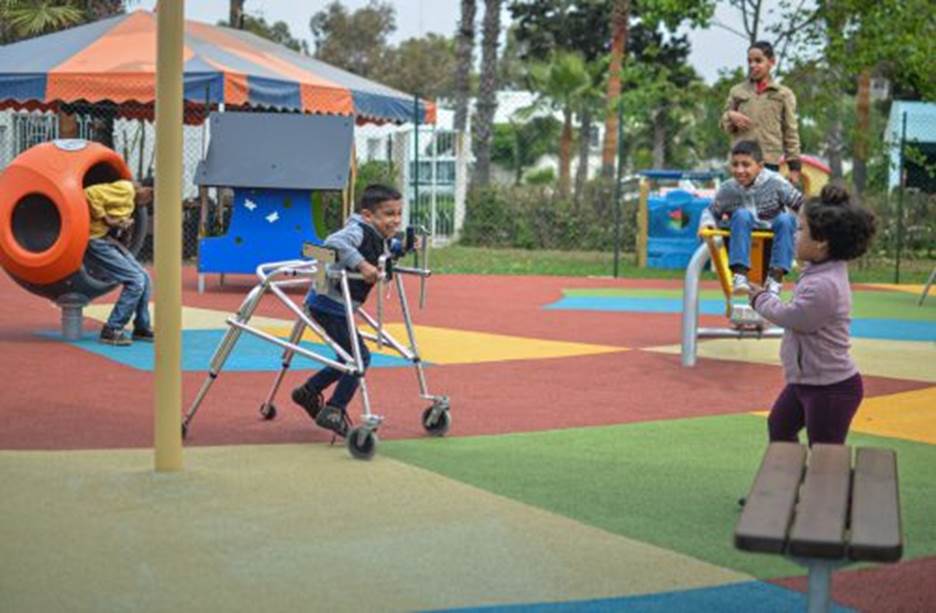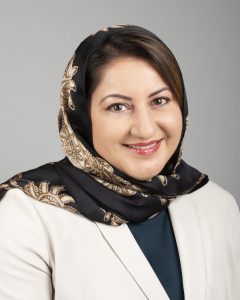
Bloom Charity creates play spaces in orphanages across Morocco, filling an essential gap and providing safer happier spaces for kids in the North African nation
Raising Happy, Healthy Kids in Orphanages
By AB Wire
Trust a mom to know what a kid needs just by her instinct, even when no words are spoken. Back in 2017, driven by the same motherly instincts, four South Asian American moms came together to form Bloom Charity in Richmond, Virginia, to fill an essential gap and provide safer-happier spaces for kids in Morocco.
It began as a vision in 2015 when the founders began volunteering in Morocco and evolved into a nonprofit in 2017, building its very first orphanage play garden. Today, having built 10 play gardens along with Morocco’s very first handicap-accessible playscape, the organization has stepped up its advocacy work.
Uzma Ahmad, a paralegal in an immigration law firm, along with her sisters Amina Shams and Noma Samee and childhood friend Mona Reza, saw a gap in the care and protection offered to orphans during their voluntary work in the North African nation.
They noticed that often these little kids, battered by life’s storms, even when offered support, tend to miss out on play-based activities, vital for kids’ healthy growth. The moms embarked on an onerous yet groundbreaking journey for underserved kids. The ladies dreamt of creating play gardens in orphanages.
Today, the charity is run by founding member Uzma Ahmad and her sister. It now also hosts enrichment activities and serves as a beacon of hope and happiness for children in orphanages in Morocco.
The American Bazaar catches up with Bloom Charity founder Uzma Ahmad. Born in Washington, DC, to parents who immigrated from Pakistan to the US in the 1960s, Ahmad currently lives in Potomac, MD, and has three grown-up kids. Here she tells us more about her thoughtful project, future plans, and the need to raise happier kids.
American Bazaar: Tell us a bit about Bloom Charity and the idea of building playgrounds in orphanages. It indeed is innovative as most charities usually focus on education, nutrition etc. Why did you think about playgrounds exclusively?

Uzma Ahmed: Bloom Charity began in 2017 by a group of four moms who wanted to support the needs of children living in orphanages in Morocco. In particular we wanted to address their physical, emotional, mental health, and early childhood education and development needs. We recognized that orphans were receiving food and shelter, yet the statistics about their long-term outcomes are tragic. 80% of these children grow up to become criminal offenders, 70% have depression and a staggering 10% die by suicide. The unequal access to private preschool causes children from orphanages to enter school two years after their peers and as a result, they often fall behind and are unable to keep up. Furthermore, children with disabilities are further marginalized and their situations are even more heartbreaking. We decided to focus on improving children’s cognitive and emotional development through our Magical PlayGardens campaign. By building green spaces and play spaces in orphanages we provide the children (as well as their caregivers) with beautiful open spaces in which they can play, laugh and learn. This choice was based on extensive research into the benefits of play for a child’s healthy development. These spaces create an area in which other enrichment activities can also be implemented by the caregivers. We have seen each orphanage utilize the space in ways we never imagined. They have brought yoga, art, music and so much more into the spaces.
AB: Tell us about some of your recent or ongoing projects…
UA: We have an ongoing project in Dakhla, Morocco. Our representative in Morocco is Khalid Allaoui who joined Bloom in 2018 and has been a key part of our work. He is in Dakhla right now representing Bloom as we develop plans to build our next playground in the orphanage there (which will also include a martial arts room). We are working with two other US based organizations that are also working at the Dakhla orphanage on a mission right now. The Paul Chester Children’s Hope Foundation and Volunteer Morocco.
AB: You are from a Pakistani American background. Tell us how and why you chose Morocco for your philanthropy projects. Is there a special connection to the place?
They both adopted and brought their children to the US. Initially, before we started our nonprofit we started sponsoring the younger children for preschool education to help compensate for the education gap. We sponsored all the four-year-olds at the orphanage and arranged for a bus to take them and bring them back. Then, as we learned more and did research, we decided providing play spaces would be the most beneficial in the long term
AB: What are the challenges if any that you faced along the way?
UA: As far as challenges, we have been very lucky to get a lot of support from the Moroccan Embassy in the US. Our biggest challenge is that we are a small group of unpaid volunteers who also have a lot of other responsibilities. So, managing the work and all the administrative tasks can get overwhelming at times. We really have a very small overhead as we do most of the work ourselves.
AB: Five years and ten play spaces later, what would you say have been your biggest achievements?
UA: We cherish the difference we have made in a short five-year time. We have built 10 Play Gardens throughout Morocco in orphanages in cities including Meknes, Sale, Casablanca, Fes, Essaouira, and Errachidia Our biggest project was a handicap accessible Play Garden at Baouafi Orphanage in Casablanca. From our understanding, this was the first fully handicapped-accessible playground in the country of Morocco. We believe in a child’s fundamental human right to play. This right is acknowledged by the United Nations. What we witnessed when we began our charity was children trapped in small rooms or in cots, without any color or sensory stimulation, much less space to express their natural childhood exuberance. Play teaches children so much, it builds their confidence, helps them develop friendships and resilience, it nourishes their brains and their bodies to grow and thrive.
One of our founding team members, Mona Reza, is a tax attorney so she was instrumental in setting us up with very transparent and highly ethical standards. Due to our high level of transparency our charity has maintained a platinum seal of approval on Guidestar. One of the things we spent a large amount of time on was ensuring that every penny we raised was accounted for to our donors. Our primary expense is the payments we make to the builders and designers of our projects. We pay them directly rather than give the money to the orphanages. This helps us to know exactly where our funds are going. Our funding is very grassroots. We started with our personal networks and through social media we have grown our fundraising base over the last five years. – The American Bazaar

